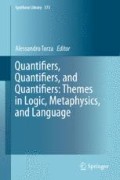Abstract
The aim of logic is to characterize the forms of reasoning that lead invariably from true sentences to true sentences, independently of the subject matter; thus its concerns combine semantical and inferential notions in an essential way. Up to now most proposed characterizations of logicality of sentence generating operations have been given either in semantical or inferential terms. This paper offers a combined semantical and inferential criterion for logicality (improving one originally proposed by Jeffery Zucker) and shows that any quantifier that is to be counted as logical according to that criterion is definable in first order logic.
Access this chapter
Tax calculation will be finalised at checkout
Purchases are for personal use only
Notes
- 1.
Some further contributions to the semantical approach are Sher [16] and McGee [12], and to the inferential approach is Hacking [9]; Gomez-Torrente [8] provides a useful survey of both approaches. I have critiqued the semantical approach as given by set-theoretical criteria in Feferman [4, 5] where, in conclusion, I called for some combined criterion.
- 2.
An unjustly neglected paper, along with Zucker and Tragesser [19].
- 3.
The observation that the natural deduction Introduction and Elimination rules for the operations of FOL serve to uniquely specify each such operation is, I think, well known. At any rate, one can find it stated in Zucker and Tragesser [19] p. 509. In apparent agreement with Gentzen that the Introduction rules provide the meaning of each operation, they say that the related Elimination rules serve to “stabilize” or “delimit” it.
- 4.
Zucker and Tragesser [19], pp. 502–03 make further assumptions about the nature of the rules in a natural deduction calculus for a candidate operator. Since our criterion will be formulated under much looser assumptions, we don’t have to invoke those here.
- 5.
These are called outer extensions in Feferman [3], but in the case at hand they are just ordinary extensions with one sort fixed (or “stationary” in the language of that paper), namely the sort of individuals.
- 6.
At the 2011 Workshop on Logical Constants in Ljubljana referred to in Footnote 7.
- 7.
The main body of material for this article was first presented for a talk at the ESSLLI Workshop on Logical Constants, Ljubljana, Aug. 9, 2011. A second presentation was made on May 23, 2012 at a conference at CUNY in honor of Sergei Artemov, on the occasion of his 60th birthday.
References
Barwise, J., and S. Feferman. (eds.). 1985. Model-theoretic logics, Perspectives in mathematical logic series. New York: Springer.
Feferman, S. 1968. Lectures on proof theory. Proceedings of the summer school in logic, Leeds. Lecture notes in mathematics, vol. 70, 1–107.
Feferman, S. 1968. Persistent and invariant formulas for outer extensions. Compositio Mathematica 20: 29–52.
Feferman, S. 1999. Logic, logics and logicism. Notre Dame Journal of Formal Logic 40: 31–54.
Feferman, S. 2010. Set-theoretical invariance criteria for logicality. Notre Dame Journal of Formal Logic 51: 3–20.
Gentzen, G. 1935. Untersuchungen über das logische Schliessen. Mathematische Zeitschrift 39: 176–210; 405–431. (English translation in Gentzen [7], 68–131).
Gentzen, G. 1969. The collected papers of Gerhard Gentzen, ed. M.E. Szabo. Amsterdam: North-Holland.
Gómez-Torrente, M. 2002. The problem of logical constants. Bulletin of Symbolic Logic 8: 1–37.
Hacking, I. 1997. What is logic? Journal of Philosophy 76: 285–319.
Keisler, J. 1970. Logic with the quantifier “there exist uncountably many”. Annals of Mathematical Logic 1: 1–93.
Lindström, P. 1966. First order predicate logic with generalized quantifiers. Theoria 32: 186–195.
McGee, V. 1996. Logical operations. Journal of Philosophical Logic 25: 567–580.
Peters, S., and D. Westerståhl. 2006. Quantifiers in language and logic. Oxford: Clarendon Press.
Prawitz, D. 1965. Natural deduction. A proof-theoretical study; 2nd edn. (2006). Mineola: Dover Publications.
Quine, W.V.O. 1986. The philosophy of logic, 2nd ed. Cambridge: Harvard University Press.
Sher, G. 1991. The bounds of logic. Cambridge: MIT.
Tarski, A. 1986. What are logical notions? History and Philosophy of Logic 7: 143–154.
Zucker, J.I. 1978. The adequacy problem for classical logic. Journal of Philosophical Logic 7: 517–535.
Zucker, J.I., and R.S. Tragesser. 1978. The adequacy problem for inferential logic. Journal of Philosophical Logic 7: 501–516.
Acknowledgements
I would like to thank Jeremy Avigad, Denis Bonnay, Fredrik Engström, Lauri Hella, Michael Rathjen, Dag Westerståhl and Jeffery Zucker for their useful comments on a draft of this article.
Author information
Authors and Affiliations
Corresponding author
Editor information
Editors and Affiliations
Rights and permissions
Copyright information
© 2015 Springer International Publishing Switzerland
About this chapter
Cite this chapter
Feferman, S. (2015). Which Quantifiers Are Logical? A Combined Semantical and Inferential Criterion. In: Torza, A. (eds) Quantifiers, Quantifiers, and Quantifiers: Themes in Logic, Metaphysics, and Language. Synthese Library, vol 373. Springer, Cham. https://doi.org/10.1007/978-3-319-18362-6_2
Download citation
DOI: https://doi.org/10.1007/978-3-319-18362-6_2
Publisher Name: Springer, Cham
Print ISBN: 978-3-319-18361-9
Online ISBN: 978-3-319-18362-6
eBook Packages: Humanities, Social Sciences and LawPhilosophy and Religion (R0)

